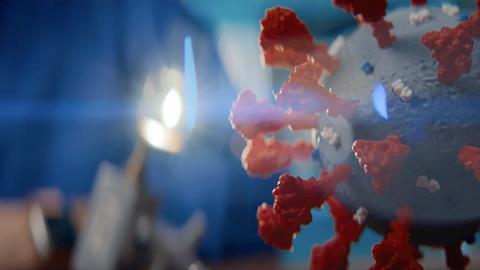 Sponsored content
Sponsored content
On Ten Productions has approached its debut documentary like a detective crime thriller, putting the origins of the pandemic under the microscope in an exciting, dramatic film full of twists and turns
Production credits
Length 1 x 90 minutes
Director David Herman
Producers Keith Linn; Alex Hocking
Production company On Ten
Distributor Blue Ant Studios

Describing On Ten Productions’ debut doc, it is helpful to start by explaining what it is not. Producers Keith Linn and Alex Hocking had no desire to take viewers back to the painful experience of the Covid pandemic and lockdowns; nor did they want to amplify ill-informed conspiracy theories about the virus’s origins. Most of all, they wanted to escape the straitjacket of dry current affairs docs.
“Our film is a true crime detective thriller in the present tense. It’s about the future of biotech and the next pandemic,” says Hocking of Spiked: The Hunt For The Origin Of Covid-19. “We wanted to make a contentious story really exciting, with twists and turns, that covers the science but with a strong dramatic structure.”
In exploring the complex relationships between politics, journalism and science that underpin theories about how the outbreak began, Linn, Hocking and director David Herman (Vendetta: Truth Lies And Mafia) riff on movies from All The President’s Men to Uncut Gems, Alien and Raiders Of The Lost Ark.
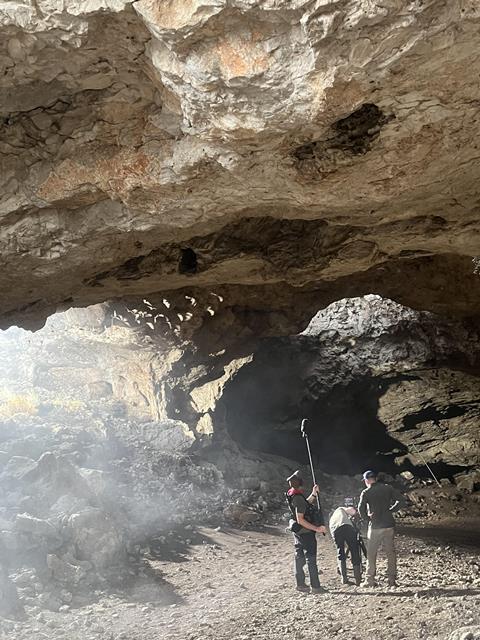
They wanted to evoke screen tropes where protagonists venture “somewhere forbidden and primordial, and then some ancient evil is awakened and brought back to civilisation,” explains Linn – highlighting the doc’s score, which starts with strings before giving way to a more synthesised sound. The clash of the two approaches serves to underline the wavering popularity of rival theories.
Several scenes are shot in a massive bat cave in Texas that refl ects the mammal’s accepted role in spreading the virus. “The core of this story is people going into these caves to get these samples, risking life and limb, to find dangerous viruses that can be used for good or be really terrible,” says Hocking.
One cliché the team wanted to avoid was the shadowy world of conspiracy thriller features, instead deploying pinks, oranges and blues to paint a heightened sensory world that suggests rival theories. “We wanted viewers to feel what they’re watching is real, but slightly hyper-real too,” Hocking notes.
But have no doubt: this film is a rigorously journalistic undertaking. When they first looked into the topic in 2022, the idea that Covid had leaked from a lab was still in the realm of hearsay. But, as they scrutinised the claim, an increasingly credible – though still contentious – case emerged.
“We had to make sure we put forward the most credible claims. People must be in no doubt that what they’re viewing is factual”
Keith Linn, producer
Filleting out the more outlandish allegations was critical in creating a doc that handles a serious subject with appropriate responsibility. “It sounds wild that the virus leaked from a lab, so everything we put in the film had to be verifiable,” says Linn. “It couldn’t just be people talking about shady intelligence, or saying ‘this might have happened’.
“We did a number of interviews like that but, without any verifiable proof, they weren’t going to go into the doc.
“We had to make sure we were putting forward the most credible claims – because it’s already been labelled a conspiracy theory, it’s highly contentious. It was pivotal that when people watch the film, they are in no doubt that what they’re viewing is factual and doesn’t overreach.
“There are times when we could have stepped further into the contention, but to protect our story, we drew a pretty conservative circle around the story we wanted to tell.”
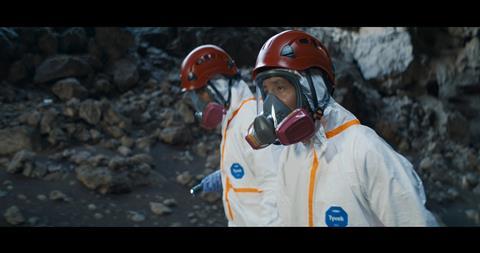
From economists to virologists, Spiked offers a balance of views and, as with avoiding the risk of platforming bunk theories, acknowledges that like the political football it is juggling, it had to avoid becoming one too.
The filmmakers were also aware of scientists publicly stating there was no way Covid could have come from a lab, while privately emailing each other to say the opposite.
“We had to be aware of people’s political games, and of those trying to further their careers. Everything becomes polarised in a case like this. The idea that whether a virus spilled from a lab could be a left/right issue seemed absurd to us – but it’s one of the reasons why we wanted to make the film.”
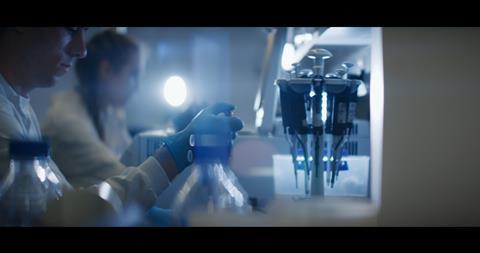
Given this polarisation, Linn and Hocking were acutely aware contributors might be hesitant and – already facing a mountain of abuse online – decline to put their heads above the parapet. It demanded a potentially exposing level of openness from the pair.
“A lot of producers are used to keeping their cards close to their chest, but we disagree with that approach,” says Linn. “It has to be collaborative, and you have to bring people with you rather than tricking them into things they don’t understand.”
Hocking explains: “We said to everybody, ‘We will do a long interview with you, at a time that’s convenient to you; it’s your opportunity to lay out your side of the story. We’re offering you a platform to tell your side as cogently and persuasively as you can – and we’ll be doing that for the other side too.’ People respected that, especially in a debate that’s become so toxic.”
The story was made even more complicated by it being a live issue, with concurrent US congressional hearings during the 12 months of filming – and six months of edits – forcing scripts to be torn up several times. Finding a throughline on which to peg the doc was no small task as the team sought to do justice to the huge amount of work undertaken by myriad contributors.
Hocking and Linn approached the topic agnostically. Both readily admit that their allegiances shifted throughout as new discoveries on both sides of the fence forced them to confront their prejudices.
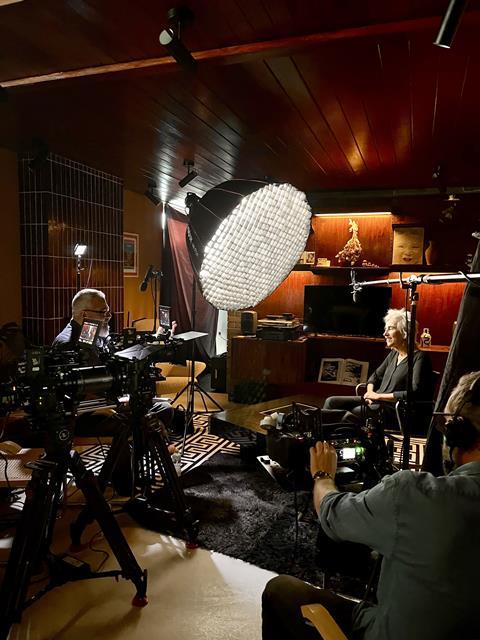
“It was important to us to keep that middle ground, so we don’t feel we’re making a film that services either side,” Linn says. “When we finished the film, David said, ‘It probably came from nature.’ Then we sat in the grade watching it, and he said, ‘Oh f***, it might have come from a lab…’ Hopefully two people will watch it and have a raging debate afterwards.”
One thing they never lost sight of is the 20 million-plus people who have died from Covid, and one of the doc’s chief aims is to ask tough questions ahead of the next inevitable pandemic.
“We knew buyers would ask if they’re going to get some heat from putting out something that’s not correct,” Hocking says. “All the way through, we present two sides not just for conflict, but to build in the right to reply.”
In putting On Ten Productions on the map, Linn says, the doc illustrates the indie’s ambition to make big, noisy, blockbuster docs.
“Smart and popular is a phrase we bandied around to begin with,” he says. “This story was perfect for that: a blue-chip, pacy, thriller feature doc that is scientifically rigorous and creates a debate. If we can continue to make films like this, we’ll be very happy.”
BLUE ANT STUDIOS ON TAKING THE STORY TO MIPCOM
With its unique take on one of the biggest stories of our times, Spiked: The Hunt For The Origin Of Covid-19 is one of distributor Blue Ant Studios’ priority titles for Mipcom.
“Very few subjects have such broad audience appeal or have impacted so many people’s lives globally and simultaneously,” says global head of acquisitions & content strategy Lilla Hurst. “I love a film that will spark a conversation.”
Indeed, one of the key messages of Blue Ant’s pitch is that couples, families and friends should expect to challenge each other over their conclusions.
On Ten Productions and Blue Ant started talking about the project early in its development, with Hurst admiring the filmmakers’ present tense take on the story. “They never wanted to present a fait accompli,” she says.
Two things solidified her faith in the project: the balance and quality of its contributors, and David Herman – who helmed C4’s Osama Bin Laden: The Road To 9/11 – signing on as director.
Blue Ant also relished the chance to present On Ten’s debut feature. “We’ve been talking to Keith and Alex about their development slate for a couple of years,” says Hurst. “It’s testament to our strategy of nurturing relationships with third-party producers.”
Hurst believes Spiked! can serve as an example of how Blue Ant offers a 360-degree approach to working with thirdparty indies, bringing genre and buyer market intelligence and building producer relationships.
The doc’s combination of a ‘whodunnit’ narrative and forward-looking perspective won over Hurst, who admits she is “on the fence” about Covid’s origins. It’s a global story with global potential, though Blue Ant is realistic that it doesn’t sit comfortably with buyers’ in the region where Covid began.
But whatever happened in Wuhan, she says, the message is the same: “The point is that both scenarios are viable – and either could lead to the next pandemic.”



























